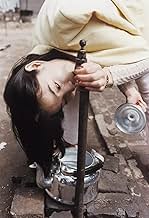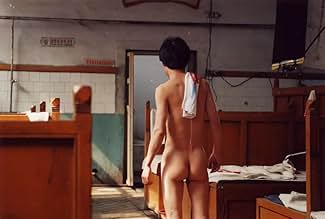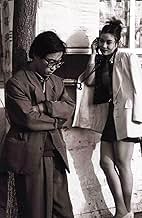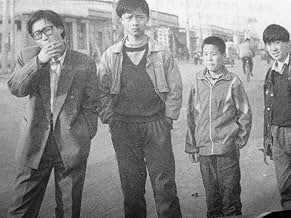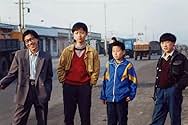IMDb RATING
7.4/10
3.6K
YOUR RATING
A small town pickpocket whose friends have moved on to higher trades finds himself bitter and unable to adapt.A small town pickpocket whose friends have moved on to higher trades finds himself bitter and unable to adapt.A small town pickpocket whose friends have moved on to higher trades finds himself bitter and unable to adapt.
- Awards
- 7 wins & 1 nomination total
- Director
- Writer
- All cast & crew
- Production, box office & more at IMDbPro
Featured reviews
"This is a film about our worries and our uneasiness. Having to cope with a dysfunctional society, we take refuge in solitude which is a substitute for dignity
It is finally a film about my native town and about contemporary China." - Jia Zhangke
A sense of longing permeates Xiao Wu, a 1997 film by the acclaimed independent Chinese director Jia Zhangke (Platform, Unknown Pleasures). Set in Jia's home city of Fengyang in Shanxi province, the film is basically a series of incidents in the life of petty thief and pickpocket, Xiao Wu. It is a compelling portrait of an individual in free-fall and, like other films by the director, shows the corrupting influence of Western values on an entire generation of Chinese. The film is reminiscent of the works of Robert Bresson in its use of non-professional actors, environmental sound, and in its spare cinematography by Yu Lik-Wai.
Xiao Wu (Hong Wei Wang) wanders about aimlessly with lots of money to spend and little to spend it on except call girls at the local karaoke bar. He befriends Mei Mei (Hao Hongjian), and they start to develop a tentative relationship but his social awkwardness leads to ultimate rejection. Wu's friends have given up the life of crime and do not want to have anymore to do with him. His best friend, Jin Xiao Yong has just been voted a "Model Entrepreneur" for his activities in cigarette trafficking and does not invite Wu to his wedding. He even returns Wu's gift of money because it is "tainted". The scene between the two old friends discussing the wedding is heartbreaking in the look of rejection on Wu's face.
With no other work to fall back on, Wu is forced to continue his petty crimes, constantly running afoul of the police. In the background, the government has issued an order to round up street criminals. Wu seems bewildered by the fact that his friends do not want to associate with him and he is unable to grasp the meaning of the police crackdown. He grows increasingly alienated and lonely as he loses his friends who go straight, his girl friend Mei Mei who leaves town, and his family who eject him after an argument over a ring.
Jia captures the rhythm and feel of day-to-day life in Fengyang. This is life as it is actually lived, not as a series of dramatic events forced into a narrative structure. His film succeeds not only as social commentary but also as an acutely perceptive realization of the psychology of a self-absorbed individual. One of the most revealing scenes is when Wu stubbornly refuses to sing with Mei Mei at the karaoke bar but instead goes to a bathhouse and, alone and naked, sings a plaintive song to the empty room. After Mei Mei leaves him, things seem to spiral downward for Wu. In a final sequence, he is shown after his arrest, not as a victim or hero, but as an off-screen object to be gazed at and mocked by people in the street. It is a scene of personal tragedy, but in the universality of its compassion, it becomes a spiritual revelation. Xiao Wu is one of the best films of the 90s.
A sense of longing permeates Xiao Wu, a 1997 film by the acclaimed independent Chinese director Jia Zhangke (Platform, Unknown Pleasures). Set in Jia's home city of Fengyang in Shanxi province, the film is basically a series of incidents in the life of petty thief and pickpocket, Xiao Wu. It is a compelling portrait of an individual in free-fall and, like other films by the director, shows the corrupting influence of Western values on an entire generation of Chinese. The film is reminiscent of the works of Robert Bresson in its use of non-professional actors, environmental sound, and in its spare cinematography by Yu Lik-Wai.
Xiao Wu (Hong Wei Wang) wanders about aimlessly with lots of money to spend and little to spend it on except call girls at the local karaoke bar. He befriends Mei Mei (Hao Hongjian), and they start to develop a tentative relationship but his social awkwardness leads to ultimate rejection. Wu's friends have given up the life of crime and do not want to have anymore to do with him. His best friend, Jin Xiao Yong has just been voted a "Model Entrepreneur" for his activities in cigarette trafficking and does not invite Wu to his wedding. He even returns Wu's gift of money because it is "tainted". The scene between the two old friends discussing the wedding is heartbreaking in the look of rejection on Wu's face.
With no other work to fall back on, Wu is forced to continue his petty crimes, constantly running afoul of the police. In the background, the government has issued an order to round up street criminals. Wu seems bewildered by the fact that his friends do not want to associate with him and he is unable to grasp the meaning of the police crackdown. He grows increasingly alienated and lonely as he loses his friends who go straight, his girl friend Mei Mei who leaves town, and his family who eject him after an argument over a ring.
Jia captures the rhythm and feel of day-to-day life in Fengyang. This is life as it is actually lived, not as a series of dramatic events forced into a narrative structure. His film succeeds not only as social commentary but also as an acutely perceptive realization of the psychology of a self-absorbed individual. One of the most revealing scenes is when Wu stubbornly refuses to sing with Mei Mei at the karaoke bar but instead goes to a bathhouse and, alone and naked, sings a plaintive song to the empty room. After Mei Mei leaves him, things seem to spiral downward for Wu. In a final sequence, he is shown after his arrest, not as a victim or hero, but as an off-screen object to be gazed at and mocked by people in the street. It is a scene of personal tragedy, but in the universality of its compassion, it becomes a spiritual revelation. Xiao Wu is one of the best films of the 90s.
This no budget film is shot with a hand held camera. It shows, but this does not affect the quality of the film. The director has made an intense movie about, Chinese street life. However the culture in China is very different from the west, we can see that the problems of little Wu are universal.
The sound mixing is garbage, with a substantial amount of noise. The dialect cannot be understood. The camera is shaky. The performance is pretty amateurish. The pace is slow. All in all, this film is an unwatchable mess.
Unlike a lot of other contemporary Chinese films, Xiao Wu succeeds in gaining viewers empathy for the title character. We never really find out how the so-called "artisan pickpocket" got himself into the state he's in; it's almost as if he woke up one morning to find that he was alone and jobless at an age when he should be settling down like all of his friends. However, not knowing how he arrived at this point makes his growing desperation more tangible as we see him reaching out to everyone he can, only to be rejected.
Wang Hongwei is amazing as the title character, he makes it easy to relate to the character's loneliness and longing. Considering the actors in Xiao Wu are all amateurs, Wang's performance is even more amazing. Granted, he was given a great character to work with: in spite of his occupation, Xiao Wu is a nice guy. (His beautifully awkward relationship with the karaoke hostess is a fine example of this).
All in all, I think this is one of the best Chinese films from the past decade. The characters are better developed than in other contemporary films, and the story is neither contrived nor simplistic. Xiao Wu would seem to be a lot more accessible than other Chinese art films because it lacks the slow bits characteristic of that genre. I would highly recommend Xiao Wu to anyone interested in Chinese cinema.
Wang Hongwei is amazing as the title character, he makes it easy to relate to the character's loneliness and longing. Considering the actors in Xiao Wu are all amateurs, Wang's performance is even more amazing. Granted, he was given a great character to work with: in spite of his occupation, Xiao Wu is a nice guy. (His beautifully awkward relationship with the karaoke hostess is a fine example of this).
All in all, I think this is one of the best Chinese films from the past decade. The characters are better developed than in other contemporary films, and the story is neither contrived nor simplistic. Xiao Wu would seem to be a lot more accessible than other Chinese art films because it lacks the slow bits characteristic of that genre. I would highly recommend Xiao Wu to anyone interested in Chinese cinema.
He is talented pickpocket but also sends the ids back to police. On the outside he is a boring persona but he has multitude of charisma. He falls in love, which was his chance to get out of all this but couldnt. He isnt ready to let go of his talent until the karma catches up with him. Will he beat the karma or get sucked of even the last bit of conscience he has left. The hiring of non-professional actors makes this film much better.
Did you know
- TriviaJia Zhang-ke: the man sent by Xiao Yang to return Xiao Wu's wedding present.
- ConnectionsReferenced in Plaisirs inconnus (2002)
- How long is Pickpocket?Powered by Alexa
Details
Box office
- Gross worldwide
- $1,569
- Runtime1 hour 45 minutes
- Color
- Aspect ratio
- 1.37 : 1
Contribute to this page
Suggest an edit or add missing content

Top Gap
By what name was Xiao Wu, artisan pickpocket (1997) officially released in Canada in English?
Answer
